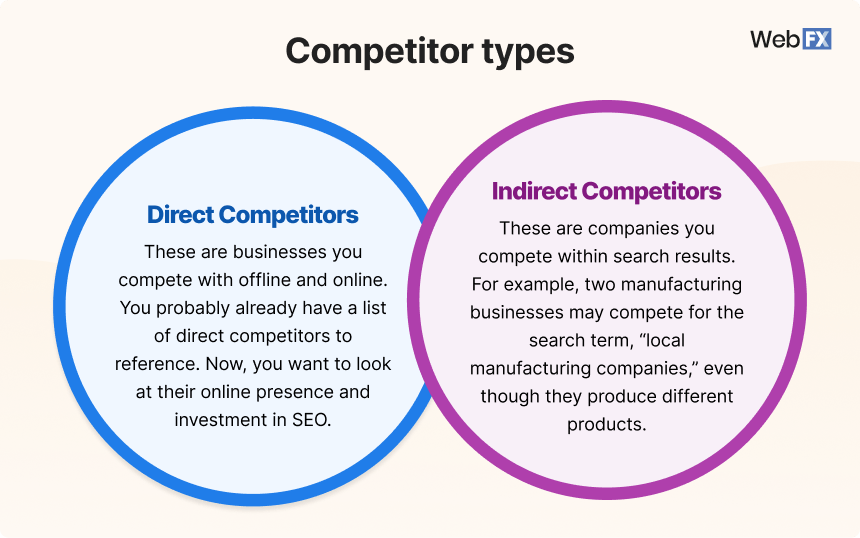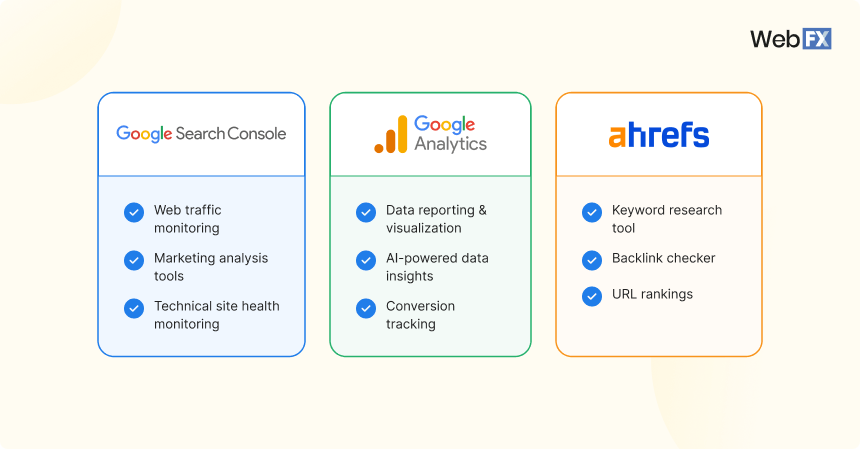-
 Published: Jul 3, 2025
Published: Jul 3, 2025
-
 9 min. read
9 min. read
-
Summarize in ChatGPT
-
 Lornah Ngugi
Lornah Ngugi Marketing Writer
Marketing Writer
- Lornah Ngugi is a seasoned digital marketing writer with 6+ years of experience translating complex marketing strategies into engaging, results-driven content. She holds a B.S. in Business Information Technology and is certified in HubSpot Academy, Google Analytics, LinkedIn Marketing, and Google Digital Academy. Lornah regularly contributes to the WebFX blog and SEO.com, where she’s authored hundreds of marketing guides that help readers turn their goals into measurable results through practical, data-informed insights. When she’s not writing, you’ll find her enjoying a quiet walk in the park, sipping black coffee, or finding creative inspiration in a good chocolate bar.
Table of Contents
- What is search engine optimization management?
- Why is SEO management important?
- What are the components of SEO management?
- 1. Audience research
- 2. Competitor analysis
- 3. In-depth keyword research
- 4. Consistent content creation
- 5. On-page SEO
- 6. Technical SEO
- 7. Monthly analysis and reporting
- Outsource your SEO management to WebFX
What is SEO Management?
SEO management is the process of continuously maintaining, adjusting, adapting, and modifying your SEO strategy to maximize your results and achieve your marketing, sales, and business goals.
Did you know that over 50% of website traffic is driven by organic search? That’s why more businesses looking to grow their search engine presence, business, and most importantly, revenue are putting greater emphasis on search engine optimization (SEO) and management.
Whether you’re familiar with SEO or new to the party, this post will provide all the information you need to get started with building a scalable SEO management strategy that helps your business thrive on search engines.
What is search engine optimization management?
Before getting into the definition of SEO management, let’s be clear on what is SEO. As you already know, SEO is the process of improving your visibility in relevant search engine results pages (SERPs) on search engines with specific strategies and techniques.
However, it’s not a set-it-and-forget process. It requires ongoing management to maintain your rankings and visibility on search engines. This is where SEO management comes in.
SEO management is basically the process of maintaining, adjusting, adapting, and modifying your SEO strategy to maximize your results and achieve your marketing, sales, and business goals.
So, if you were to distinguish these two buzzwords, we’d say SEO is what you do to get your site to rank and be visible, while SEO management is how you ensure you maintain your visibility and rankings.
While you can manage your SEO yourself with the right tools and skills, we recommend outsourcing to a professional SEO management agency, like WebFX.
Outsourcing spares you the stress of keeping up with evolving SEO trends and provides you access to a team of experts with advanced skills, innovative tools, and reliable experience.
Whether your business partners with an agency or manages your strategy in-house, it’s essential to understand what SEO management includes. That way, you can build a foundation for a competitive strategy that actually drives revenue for your company.
Why is SEO management important?
SEO management is an incredibly beneficial process for businesses looking to maintain high website traffic, leads, and conversions.
It ensures that your business website not only gets to the highest rankings on Google and other search engines but stays there so you can continue reaping the benefits of SEO.
With strategic SEO management, you can reap the following benefits:
- Helps you avoid ranking drops due to algorithm changes and updates
- Boosts organic traffic by ensuring you consistently attract users actively searching for your products and services
- Improves user experience by ensuring your website is always well-structured, easy to navigate, and mobile-friendly
- Keeps you ahead of competitors who are most probably keeping up with their SEO website management
What are the components of SEO management?
To keep your website running smoothly, you must implement some key SEO management strategies. These strategies or components of SEO management are geared towards ensuring that your website looks good and runs well.
1. Audience research
Companies that excel at SEO have an in-depth understanding of their audience.
They’ve done the research and understand what their target market wants from their business, product, or service. These companies also know the common questions and problems of their target audience. If you want to succeed at SEO management, you need to understand your target market at this level.
Invest your time researching your target market, and answer the following questions:
- What problems does my product or service solve for users?
- What issues does my target market have with other providers?
- What demographic features define my target audience?
- Where does my target market go when they have problems or questions?
Even if you have marketing personas developed for your target audience, it helps to reevaluate your past research. Consumers can change over time. If you use outdated marketing personas, it can cause your SEO strategy to flop, which doesn’t help you or your company.
2. Competitor analysis
A competitor analysis can offer tremendous insight, which is why it’s a core part of SEO management. Whether you’re partnering with an SEO agency or leading the initiative in-house, make a competitor analysis part of your plan. For competitor analysis, it’s helpful to look at the following competitor types:
As a part of your competitor analysis, you want to determine the organization’s SEO strategy. In some cases, you may find that a direct competitor doesn’t have an SEO strategy. That’s where indirect competitors can help as most owe their high ranking in search results to SEO.
As a part of your competitor analysis, you want to determine the organization’s SEO strategy. In some cases, you may find that a direct competitor doesn’t have an SEO strategy. That’s where indirect competitors can help as most owe their high ranking in search results to SEO.
Learn about a company’s SEO strategy by looking at the following:
- Backlink profile
- Domain age
- Optimization practices
- Traffic value
- Targeted keywords
For many businesses, this step is a challenge because it introduces several aspects of technical SEO.
3. In-depth keyword research
SEO management involves ongoing keyword research to ensure you consistently target the right keywords and accurately address search intent. We recommend monthly keyword research because it informs your content creation, site structuring, and performance tracking.
Conducting regular content audits also helps uncover opportunities and gaps that will help you rank higher and boost conversions.
Looking for a way to outdo your top-performing competitor? Keyword research will allow you insight into what’s helping them rank so you can capitalize on their wins and explore the opportunities they missed.
Ultimately, in-depth keyword research helps you discover search terms with promising search volumes and relevance to your business, attracting clicks that convert. Besides, it trickles into improving your website’s technical SEO by helping you better optimize metadata.
4. Consistent content creation
Content creation is at the heart of successful SEO management. As a matter of fact, 54% of SEO experts admit that quality content is the most effective SEO tactic.
It’s not just about filling the pages on your website with words but about strategically producing relevant and valuable content that your audience engages with.
You can make content creation a core part of your SEO management routine by:
- Developing a content calendar that accounts for both evergreen and trending topics
- Producing content for every step of the buyer’s journey with informational, comparison, and conversion-focused content
- Performing regular content audits to evaluate what’s performing well, underperforming, outdated, or irrelevant
- Scheduling regular content refreshes to update older posts with fresh information, keywords, and links to keep them ranking
5. On-page SEO
On-page SEO fine-tunes elements of your website that provide a smooth user experience and make it easier for search engines to index and rank your content. It focuses on improving ranking factors visible on your website.
The following ongoing on-page SEO services are sure to help you drive revenue from organic search:
- Metadata optimization: It involves optimizing title tags and meta descriptions to include keywords and engaging language that convinces web users and search engines that your content is relevant to their queries.
- Internal link building: A strong internal linking strategy guides users and search engines through your website. Ongoing management helps replace mismatched anchor text and fix any broken or outdated links.
- URL optimization: Optimizing your URLs involves making them legible and understandable to both search engines and users. Updating them over time also ensures they’re relevant to the page context and don’t contain random numbers and letters.
- Image optimization: Other than updating the images on your web pages from time to time, you should update your alt tags. These tags ensure search engines understand your images and ensure people with screen readers can “read them.”
- Structured data inclusion: Schema markups help search engines better understand and categorize your web pages and push them up to position zero or Google AI Overviews. This makes your website more prominent and clickable to your target audience.
6. Technical SEO
Technical SEO involves optimizing all the backend elements of your website to ensure people and search engines can easily and conveniently access your website. Ongoing technical SEO management ensures that your website appears and performs well.
It involves an audit that reveals guidelines for optimizing sites to be mobile-friendly, fast-loading, and easy to navigate. Compressing images, enabling caching, and removing unused scripts and plugins can achieve this.
You should also ensure search engines can easily access your website and crawl, index, and rank it by submitting XML sitemaps, monitoring crawl errors, and fixing broken links.
Maintaining valid SSL certificates ensures site security and accessibility. Canonicalization prevents duplicate content issues by signaling to search engines which page versions to index.
7. Monthly analysis and reporting
Like other digital marketing strategies, SEO uses data.
With data from your website, you can measure your SEO strategy’s performance. Plus, you can find areas of improvement and make data-backed decisions when it comes to your next move.
If you partner with an SEO agency, like WebFX, you can expect monthly reports from your dedicated account manager. In some cases, you may want to monitor your SEO strategy on a weekly basis, which you can do with our team.
Even if you decide to bring your SEO management in-house, you want to establish a routine schedule for checking and measuring your strategy’s performance. A monthly or weekly basis is the industry’s standard, which is why many businesses follow this schedule.
As a part of your monthly reporting, try looking at increases in the following areas:
- Organic traffic
- Rankings in search results
- Backlinks
- Conversions
You can use tools like Google Analytics, Google Search Console, and Ahrefs to monitor your progress. Depending on your business, you may find it challenging to track the full results of your SEO strategy. With professional SEO management, you can resolve this problem.

Outsource your SEO management to WebFX
Want to hire an SEO expert to get help with managing your strategy? You’ve come to the right place!
WebFX is an award-winning SEO agency with 395+ Clutch reviews and a client recommendation score of almost 500%! Explore our case studies and client testimonials to see what we’re all about or contact us online to learn more about our SEO management services.
Plus, we have offices all around the globe! For example, we offer London SEO solutions, along with offering SEO services in cities like:
Explore our SEO services to learn how we can help, or call us at 888-601-5359 to chat with a strategist!
-
 Lornah Ngugi is a seasoned digital marketing writer with 6+ years of experience translating complex marketing strategies into engaging, results-driven content. She holds a B.S. in Business Information Technology and is certified in HubSpot Academy, Google Analytics, LinkedIn Marketing, and Google Digital Academy. Lornah regularly contributes to the WebFX blog and SEO.com, where she’s authored hundreds of marketing guides that help readers turn their goals into measurable results through practical, data-informed insights. When she’s not writing, you’ll find her enjoying a quiet walk in the park, sipping black coffee, or finding creative inspiration in a good chocolate bar.
Lornah Ngugi is a seasoned digital marketing writer with 6+ years of experience translating complex marketing strategies into engaging, results-driven content. She holds a B.S. in Business Information Technology and is certified in HubSpot Academy, Google Analytics, LinkedIn Marketing, and Google Digital Academy. Lornah regularly contributes to the WebFX blog and SEO.com, where she’s authored hundreds of marketing guides that help readers turn their goals into measurable results through practical, data-informed insights. When she’s not writing, you’ll find her enjoying a quiet walk in the park, sipping black coffee, or finding creative inspiration in a good chocolate bar. -

WebFX is a full-service marketing agency with 1,100+ client reviews and a 4.9-star rating on Clutch! Find out how our expert team and revenue-accelerating tech can drive results for you! Learn more
Try our free Marketing Calculator
Craft a tailored online marketing strategy! Utilize our free Internet marketing calculator for a custom plan based on your location, reach, timeframe, and budget.
Plan Your Marketing Budget
Table of Contents
- What is search engine optimization management?
- Why is SEO management important?
- What are the components of SEO management?
- 1. Audience research
- 2. Competitor analysis
- 3. In-depth keyword research
- 4. Consistent content creation
- 5. On-page SEO
- 6. Technical SEO
- 7. Monthly analysis and reporting
- Outsource your SEO management to WebFX

SEO Success with KOA

Proven Marketing Strategies
Try our free Marketing Calculator
Craft a tailored online marketing strategy! Utilize our free Internet marketing calculator for a custom plan based on your location, reach, timeframe, and budget.
Plan Your Marketing Budget
What to read next




